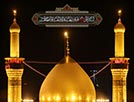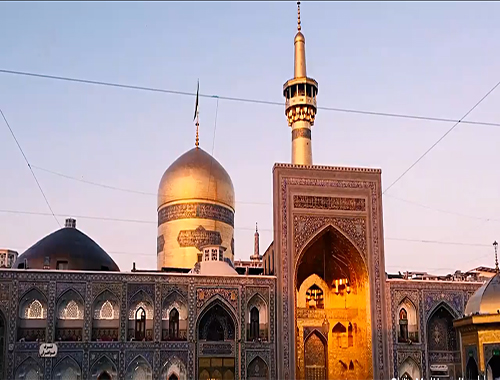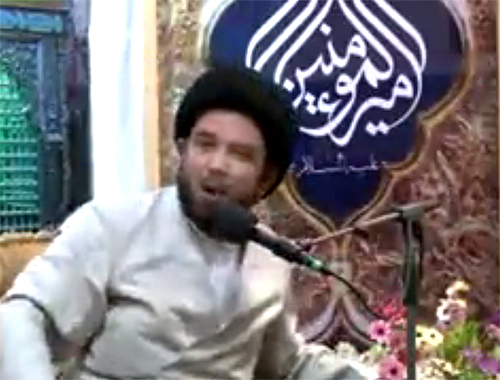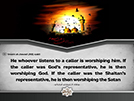Chapter 6-The Daughter of the Holy Prophet of Islam
- Details
- Hits: 3962
Chapter 6
The Daughter of the Holy Prophet of Islam
--------------------------------------------------------------------------------
Fatimah Az-Zahra', Daughter Of The Apostle Of Allah
This chapter deals with Fatimah az-Zahra' (the Radiant), the daughter of the Messenger of Allah. It treats her birth, span of life and the time of her death, as well as some of her excellences and characteristics. It consists of three sections.
Her Birth, Names And Epithets
The most predominant view in the traditions transmitted by our traditionists is that Fatimah az-Zahra' was born in Mecca, on the twentieth of Jumada 'l-Akhirah, in the fifth year of the Prophet's apostolic career. It is also asserted that when the Prophet died, Fatimah was eighteen years and seven months old.
It is reported on the authority of Jabir ibn Yazid that (the fifth Imam) al-Baqir was asked: "How long did Fatimah live after the Messenger of Allah?" He answered: "Four months; she died at the age of twenty-three." This view is close to that reported by the traditionists of the (Sunni) majority. They have asserted that she was born in the forty-first year of the Messenger of Allah's life. This means that she was born one year after the Prophet was sent by Allah as a messenger. The scholar Abu Said al-Hafiz relates in his book Sharafu'n-Nabiyy that all the children of the Messenger of Allah were born before Islam except Fatimah and Ibrahim, who were born in Islam. [71]
It is reported that the sixth Imam Ja'far as-Sadiq said:
"Fatimah has nine names with Allah. They are: Fatimah, as-Siddiqah (the Righteous), al-Mubarakah (the Blessed), at-Tahirah (the Pure), az-Zakiyyah (the Unblemished), arRadiyah (the one content with Allah's pleasure), al-Mardiyyah (the one pleasing to Allah), al-Muhaddathah (the one spoken to by angels) and az-Zahirah (the Luminous). In the Musnad (collection of transmitted hadiths) of the eighth Imam ar-Rid5, it is reported that the Prophet declared: "I named my daughter Fatimah (the Weaned One) because Allah weaned her and those who love her from the Fire." The Prophet also called her al-Batul (pure virgin), and said to `A'ishah: "O Humayra' (a redish white, a well-known epithet of `A'ishah), Fatimah is not like the women of human kind, nor does she suffer the illness you (women) suffer! " This is explained in another prophetic tradition which asserts that she never menstruated. It is likewise reported by Sunni traditionists on the authority of Anas ibn Malik, who heard Umm Salim, the wife of Abu Talhah al-Ansari, say: "Fatimah never experienced the blood of menstruation or parturition, for she was created from the waters of Paradise." This is because when the Messenger of Allah was transported to heaven, he entered Paradise, where he ate of its fruits and drank its water.
Proofs Of Her `Ismah (Sinlessness), Some Of The Signs Proving Her Status With Allah, And Traditions Indicating Her Excellence And Exalted Status
One of the most incontrovertible proofs of Fatimah's sinlessness is Allah's saying: Surely Allah wishes to remove all abomination from you, O People of the House, and purify you with a great purification [our. 33 : 33 ] . The argument in favour of this, is that the Muslim community has unanimously agreed that the `People of the House' (i.e., ahlu'l-bayt), intended in this verse are the People of the Household of the Messenger of Allah. Traditions (ahadith) of both the Shi`i and Sunni communities have asserted that this verse particularly refers to 'Ali, Fatimah, Hasan and Husayn. The Prophet, moreover, spread over them all one day a Khaybarite mantle and prayed: "O Allah, these are the People of my Household, remove all abomination from them and purify them with a great purification!" Umm Salamah said: "I too, O Apostle of Allah, am of the People of your House!" He answered: "Your lot shall be good!"
The Divine Will expressed in this verse must by necessity be either an abstract will not implemented by an action, or a will accompanied by an action. The first option is untenable because it implies no particular applicability to the People of the Prophet's House; such a will is shared by all obligated (mukallafin) human beings. Nor is abstract will by itself cause for praise. The entire community has concurred on the view that this verse proclaims the excellence of the People of the Prophet's House over all others, and that the verse refers to them alone. Thus the second option (that the Divine Will referred to in the verse is a will accompanied by action) is true, and in it is clear proof of the sinlessness of those who were intended in the verse. It implies further that it is impossible for them to commit any evil action. Moreover, any others whom we have not named here are no doubt not held by general consensus as possessing `ismah (protection from error). Thus since the verse necessarily implies sinlessness it must apply to them (the People of the Prophet's House), because it pertains to no other individuals.
Another proof of Fatimah's sinlessness is the Prophet's saying concerning her: "Fatimah is part of me. Whatever causes her hurt, hurts me." He also said: "Whoever hurts Fatimah, hurts me, and whoever hurts me, hurts Allah, exalted be His Majesty! " The Prophet said further: "Allah becomes wrathful for Fatimah's anger, and is pleased at her pleasure." Had she been one who was guilty of committing sins, it would not be that anyone causing her hurt would by this cause the Prophet himself hurt in any way. On the contrary, if anyone were to disgrace and hurt her deservedly - even if he were to inflict upon her the severest punishment permitted by the limits set by Allah - if her action necessitated such retaliation, it would be pleasing to him.
Among the signs indicating Fatimah's exalted status with Allah is an incident related by both Shi'i and Sunni traditionists on the authority of Maymunah (the Prophet's wife), who reported that Fatimah was found asleep one day, the handmill beside her turning of its own accord. She informed the Apostle of Allah of this, and he said: "Allah knew the weak condition of His handmaid; He thus inspired the handmill to turn by itself, and so it did." Among the reports asserting her excellence and high distinction over all other women is the tradition reported on the authority of `A'ishah who said: "I never saw a man more beloved of the Apostle of Allah than `Ali, or a woman more dear to him than Fatimah."
Sunni traditionists also reported on the authority of the Commander of the Faithful who said: "I asked the Messenger of Allah, `Who is more beloved to you, Fatimah or I?' He answered, `Fatimah is more beloved to me, and you are dearer to me than she is.' " These traditionists also reported from Anas ibn Malik that: "Fatimah is the most excellent of all the women of the world." In another tradition it is reported that the Prophet said: "The most excellent among the women of the world are: Maryam daughter of `Imran (that is, the virgin Mary), Asiyah daughter of Muzahim (wife of Pharaoh), Khadijah daughter of Khuwaylid and Fatimah daughter of Muhammad." It is also related on the authority of Ibn `Abbas who said: "The most excellent of the women of Paradise are: Khadijah daughter of Khuwaylid, Fatimah daughter of Muhammad, Maryam daughter of `Imran and Asiyah daughter of Muzahim." Traditionists report that `Abdu 'r-Rahman ibn `Awf said: "I heard the Apostle of Allah say, `I am a tree, Fatimah is its trunk and 'Ali is its pollen. Hasan and Husayn are its fruits, and our followers (Shi'ah) are its leaves. The roots of the tree are in the Garden of Eden, and its trunk, fruits and leaves are in Paradise.' "
Traditionists further report on the authority of `A'ishah that: "Whenever Fatimah came to the Messenger of Allah, he would rise from his seat, kiss her on the forehead, and make her sit with him." Traditionists have also reported on the authority of 'Ali ibn Ibrahim al-Qummi in his commentary of the Qur'an, as related on the authority of the sixth Imam as-Sadiq, Ja'far ibn Muhammad, who said: "We were told that our forefathers said that the Messenger of Allah often indulged in kissing the mouth of Fatimah the mistress of the women of the world, so that `A'ishah finally protested saying, `O Messenger of Allah, I see you indulge so often in kissing the mouth of Fatimah and placing your tongue in her mouth.' He answered, `Yes, O `A'ishah, when I was taken up to heaven, Gabriel took me into Paradise and brought me near the tree of Tuba (beatitude). He gave me an apple of its fruits which I ate, and which became a sperm in my loins. Thus when I returned to earth, I laid with Khadijah, and she conceived Fatimah. Whenever, therefore, I yearn for Paradise, I kiss her and place my tongue in her mouth, for I find in her the fragrance of Paradise. I also sense in her the fragrance of the tree of Tuba. Fatimah is thus a celestial human being.' "
The traditions which our Companions (that is, Shi'i hadith transmitters), may Allah be pleased with them, have reported in proof of Fatimah's special place among the children of the Apostle - her honoured status and distinction over all the women of humankind - are beyond number. We shall, therefore, limit ourselves to the reports which we have already mentioned.
Among the things which Allah completed the great honour of the Commander of the Faithful in this world and the world to come was His special favour towards him in having him unite in marriage with the noble daughter of the Messenger of Allah, who was the most beloved of all creatures to him, the consolation of his eyes and mistress of the women of the world. Among the many ahadith (traditions) concerning this event is the sound hadith reported on the authority of Anas ibn Malik, who said: "As the Apostle of Allah was sitting one day, 'Ali came to see him. He addressed him saying, `O 'Ali, what brings you here?' `I came only to greet you with the salutation of peace', `Ali replied. The Prophet declared: `Here comes Gabriel to tell me that Allah has willed to unite you in marriage with Fatimah, peace be upon her. He has, moreover, called as witnesses to her marriage a thousand angels. Allah has revealed to the tree of Tuba, "Scatter your pearls and rubies! " Black-eyed houris rushed to pick the precious stones up, which they shall exchange as presents among them till the Day of Resurrection.' "
It is related on the authority of Ibn `Abbas, who said: "On the night when Fatimah was married to 'Ali, the Messenger of Allah stood before her. Gabriel stood at her right hand and Michael at her left. Seventy thousand angels stood behind her, praising and sanctifying Allah. The Commander of the Faithful prided himself on his marriage to her on numerous occasions." Abu Ishaq ath-Thaqafi reported on the authority of Hakim ibn Jubayr, who reported from al-Hajari who related from his uncle who said: "I heard `Ali say one day, `I shall utter words which no other man would utter but that he would be a liar. I am `Abdullah (Allah's servant), and the brother of the Apostle of Allah. I am the one whose guardian is the Prophet of mercy, for I have married the mistress of all the women of the community. I am the best of the vicegerents.' " Numerous reports expressing similar ideas have been transmitted.
Ath -Thaqafi reported on the authority of Buraydah, who said: "On the nuptial night of `Ali and Fatimah, the Prophet said to 'Ali, `Do not do anything until you see me.' He then brought water - or the traditionist reported that he called for water - which he used to perform his ablutions for prayers, pouring the rest over 'Ali. The Prophet then prayed, `O Allah, bless them! Shower your blessings over them, and bless for them their two young lions (that is, their two sons Hasan and Husayn)."' ath-Thaqafi also related on the authority of Shurahil ibn Abi Sa'd, who said: "On the morning after Fatimah's wedding, the Prophet brought a skinful of milk, and said to Fatimah, 'Drink! May your father be a ransom for you.' He likewise said to `Ali, 'Drink! May your cousin be a ransom for you.' "
The Time Of Fatimah's Death And The Spot Of Her Grave
It is reported that Fatimah died on the third of Jumada 'l-Akhirah in the eleventh year of the hijrah. She survived the Prophet by only ninety-five days. It is also reported that she survived him by four months.
The Commander of the Faithful ( `Ali) himself took charge of her washing. It is reported that Asma' daughter of `Umays assisted him in washing her. Asma' related: "Fatimah had stated in her will that no one should wash her corpse except 'Ali and I. Thus we washed her together, and the Commander of the Faithful prayed over her along with Hasan and Husayn, `Amman ibn Yasir, Miqdad, `Aqil, az-Zubayr, Abu Dharr, Salman, Buraydah and a few men of Banu Hashim. They prayed over her in the night, and in accordance with her own will 'Ali the Commander of the Faithful buried her in secret."
There is much disagreement among traditionists as to the exact spot of her grave. Our own traditionists have asserted that she was buried in the Baqi `. Others said that she was buried in her own chamber, and that when the Umayyad rulers enlarged the Mosque of Medina, her grave came to be in the sanctuary. Still others argued that she was buried between the grave and pulpit of the Prophet. It is to this that the Prophet alluded in his saying: "There is between my grave and pulpit a garden of the gardens of Paradise." The first view is unlikely, while the two other views are nearer to the truth. Thus, those who wish to apply the principle of caution (ihtiyat) when performing ziyarah, or pilgrimage, to her grave, should do so in all three places.
This is all that we wished to say concerning Muhammad, the Elect Prophet (al-Mustafa) and his daughter Fatimah, the Radiant (az-Zahra'). From Allah alone comes success.
Notes:
[71] That is, Abu Sa'd or Said al-Kharkushi; see note 12 above. at-Tabrisi' (or his editor) here calls him "al-Hafiz", but he seems rather to be known as al-Wa'iz. Despite al-Kharkushi's statement as here reported by at-Tabrisi, traditionists have generally agreed that Fatimah (a. s.) was born early in the Prophet's career.

![take advantage of your [present] time](/en/media/com_hwdmediashare/files/99/f5/fb/5293162f4d04afb1ed8da3034e984340.jpg)









